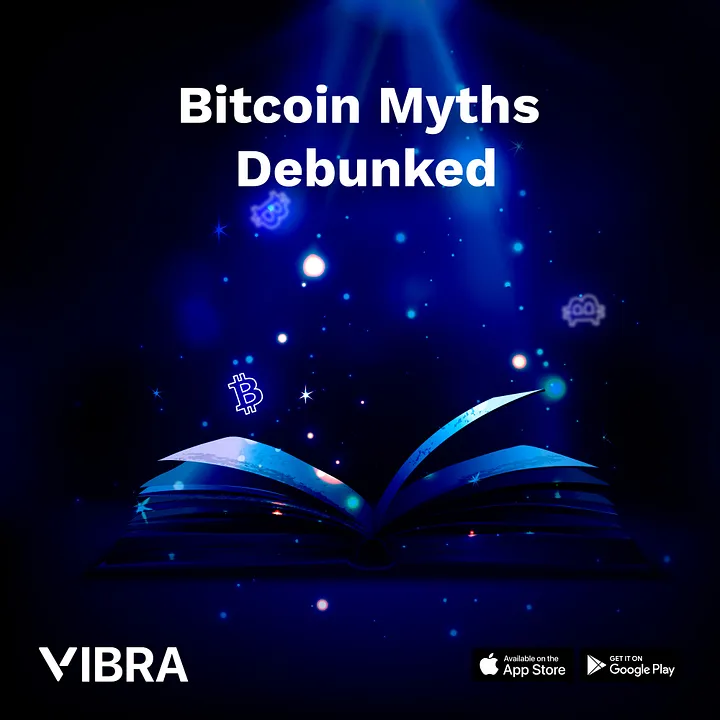“The only good is knowledge and the only evil is ignorance” — Socrates.
Bitcoin Myths Debunked
Bitcoin has gained significant popularity and acceptance since it was created in 2009. Last year, El Salvador, a Central American country officially adopted Bitcoin as a legal tender and several other countries have relaxed their laws to encourage cryptocurrency use, bringing a rise to global adoption. This was not the case a few years ago when the word ‘bitcoin’ was likened to a Ponzi pyramid scheme due to a lack of knowledge.
Bitcoin, the first cryptocurrency has earned a bad reputation over the years, especially among individuals who are non-techy and unfamiliar with cryptocurrency. The idea of money created without the government but relying on the power of computers seem like a huge pill to swallow. As a result, there are a number of myths and fallacies associated with Bitcoin and cryptocurrencies in general. We’ll examine several of the most prevalent cryptocurrency fallacies in this article and refute these claims with facts.
1. Bitcoin is a Scam: The Bitcoin boom in 2017 came in the wake of the Ponzi scheme era. ICOs and token sales were created for numerous projects and due to a lack of thorough investigation, many invested blindly in projects that never took off. This created huge fear among the populace prompting several governments to crack down on crypto activity.
Hard fact: Cryptocurrency is not a scam because people can use it as a means of payment across various online and offline merchant stores. It is also recognised by many governments with laws guiding its use across various countries.
Before investing in bitcoin, however, it is important to thoroughly learn about the crypto market. Any seasoned investor understands the importance of being cautious while investing, it’s the same with Bitcoin. One of the most used crypto abbreviations is DYOR, which urges investors to conduct their own research to determine the best entry or exit points before buying.
2. Bitcoin is Not Secure: Bitcoin is a decentralized digital currency that secures transactions via encryption. It was the first cryptocurrency created using the blockchain network, and this platform has protected bitcoin transactions for over a decade.
Hard Fact: Bitcoin network is highly secure through the use of encryption and distributed data storage.
Bitcoin is a relatively new technology, but in its twelve years of existence, it has already been shown as the most secure and reliable digital system in the world. Many governments and other financial organizations are interested in blockchain technology for a variety of reasons, one of which is that blockchain is commonly regarded as a secure and reliable platform. Although the Bitcoin network has never been hacked, hackers can steal bitcoins by getting access to bitcoin owners’ digital wallets if personal details are compromised.
3. Bitcoin Cannot Be a Store of Value Due to Volatility: Bitcoin, like the US dollar and practically every other modern fiat money, is not backed by a physical asset like gold. Inflation with fiat currencies can occur when large quantities are created, thus diluting the existing supply. However, Bitcoin is designed to be scarce from the start, there will never be more than 21 million bitcoins. And scarcity is one of the factors that contribute to the cryptocurrency’s value. In addition to the limited supply, the amount of new Bitcoin being mined is systematically decreasing over time. This makes Bitcoin resistant to inflation, and we dare say an even better store of value compared to fiat.
Hard Fact: Bitcoin was declared the best-performing asset in 2019, outpacing US stocks and gold in terms of investment returns.
4. Bitcoin is Bad for the Environment: While mining cryptocurrency consumes a lot of energy, it isn’t the primary cause of climate change. Many other businesses, like banking, need a lot of electricity on a daily basis to run their operations, from offices to computer servers and networks.
Hard Fact: Crypto-mining energy consumption is gradually decreasing as many projects migrate to more energy-efficient platforms.
5. Bitcoin is a Pyramid or Ponzi Scheme: A pyramid scheme is an elaborate scheme in which participants are compensated for recruiting new members. A Ponzi scheme is similar except that you are not paid for recruiting new members, but you do get a share of whatever new members pay to join. Bitcoin, on the other hand, is none of these things because there are no assurances or rewards for purchasing BTC, and it is also based on a decentralized system with no hierarchy and everyone is treated equally.
Hard Fact: Bitcoin's inherent value is in its property as a currency that is used for payments. Similar to fiat currency, it is a tangible asset that may be traded or used as a medium of exchange. This is not true in the case of Ponzi schemes.
Because the Bitcoin protocol is totally open-source, anyone can contribute to its development or infrastructure via BTC mining. However, numerous platforms have exploited Bitcoin for their scams, but this says nothing about the coin or the technology that underpins it. The US dollar for instance isn’t a pyramid scheme either, despite the fact that it’s widely used in many scam transactions.
VIBRA is a safe and secure wallet app that facilitates the exchange of cryptocurrency between peers easily. You can buy BTC and a variety of other crypto assets directly with cash from your local bank account and have it deposited into your VIBRA wallet in minutes. VIBRA, through its affiliate initiatives, offer an easy way for Africans to learn, earn, and make crypto trades within a community of experts.
Download the VIBRA app and experience the easy way to crypto trading!
What would you like to know about Bitcoin or cryptocurrency in general? We’ll love to hear from you. Tell us your opinion in the comment section.
